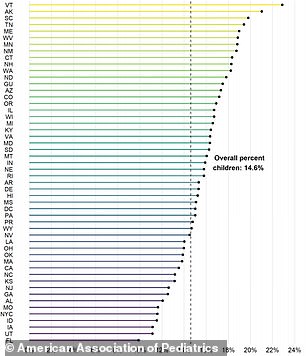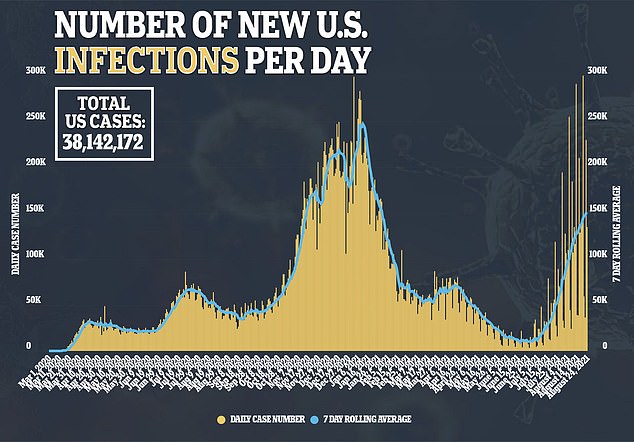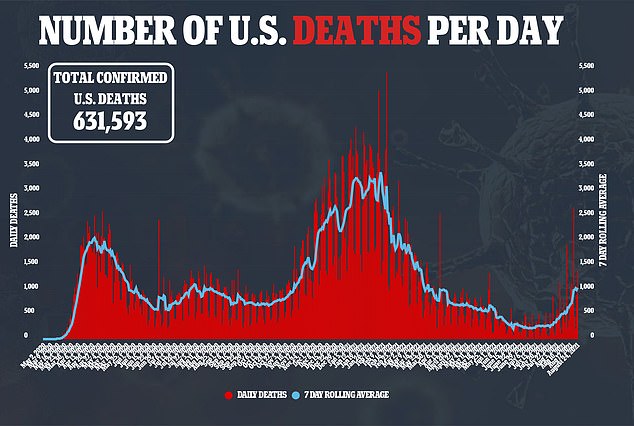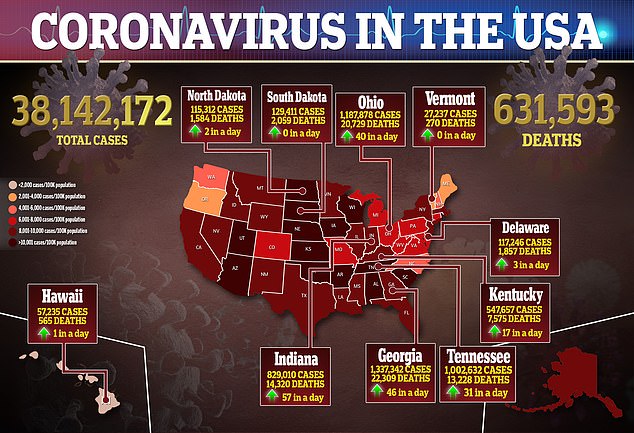COVID-19 cases among America’s children are surging as schools begin to open up.
More than 180,000 kids tested positive for the virus last week, according to a new report from the American Academy of Pediatrics (AAP).
It is a 48 percent increase over the 121,000 figure from only a week earlier, and the third highest weekly total ever recorded.
Around 4.6 million child COVID-19 cases have been recorded since the pandemic began in March 2020.
There were also 23 pediatric deaths from the virus recorded last week, a number near triple the eight deaths recorded a week earlier – but children still make up just 0.1 percent of all COVID-19 deaths.
According to the AAP, the new figures mean children account for 22.4 percent of new cases – and 14.6 percent of all cases since the pandemic began in March 2020.

More than 180,000 children tested positive for COVID-19 last week, a 50% increase over the previous week. Children now account for more than 20% of active COVID-19 cases
In Vermont, kids make up 23 percent of total cases, the most of any state.
In Alaska, 21 percent of cases are children, also has an abnormally larger share of cases among children.
There is no state in America where children make up less than 10 percent of total cases since the pandemic began.
Children are less likely to be hospitalized or die from the virus but some children do still end up suffering severe complications.

Children account for 14.6% of all COVID-19 cases since the pandemic began in March 2020
Around one percent of child COVID-19 cases require hospitalization, per the AAP, and youth make up around two percent of people hospitalized because of the virus.
The report finds that 402 children have died from Covid since March 2020, with 68 occurring after the Indian ‘Delta’ variant became dominant in the U.S.
Even when kids don’t have a severe case of the virus, there is potential for children to suffer some conditions long-term like ‘long Covid or myocarditis.
Infected children can also spread the virus to parents, teachers, staff and others.
Schools are already proving to be hotspots for the virus.
More than 23,000 students and staff in the greater Atlanta area have already either tested positive for or been exposed to the virus.
Lamar County schools, around 50 miles south of Atlanta, even had to suspend classes for two weeks after so many people had to enter quarantine the system could no longer operate.
Leaders from the AAP have been pushing for the U.S. Food and Drug Administration (FDA) to make COVID-19 vaccines available for young children in order to prevent these types of situations.
Dr Lee Savio Beers, president of the AAP, wrote an open letter to the FDA on August 5, urging the agency to fast track the vaccine for children under the age of 12.


‘I write to urge the Food and Drug Administration (FDA) to continue working aggressively towards authorizing safe and effective COVID-19 vaccines for children under age 12 as soon as possible,’ she wrote.
‘Pediatricians and the families they care for have been anxiously awaiting a vaccine that can be used in children 11 years of age and younger, and especially so now given the rise of the hyper infectious Delta variant.
‘The Delta variant is surging at extremely alarming rates in every region of America. This surge is seriously impacting all populations, including children.’
Currently, only the Pfizer-BioNTech vaccine is available to minors, with it having emergency use authorization for children aged 12 and older.
Children younger than 12 are still unable to receive any vaccine, leaving them vulnerable.
Polls find that parents of children seem to be evenly split on whether or not their kids will be receiving a COVID-19 vaccine.
One survey, conducted by CS Mott Children’s Hospital National Poll on Children’s Health at Michigan Medicine last month, found that 39 percent of parents said their children already gotten a coronavirus shot.
However, 40 percent of parents also said it was ‘unlikely’ that their children would be getting vaccinated.’

Source link : https://www.dailymail.co.uk/health/article-9927203/More-180-000-children-tested-positive-COVID-19-week-nearly-50-increase.html











